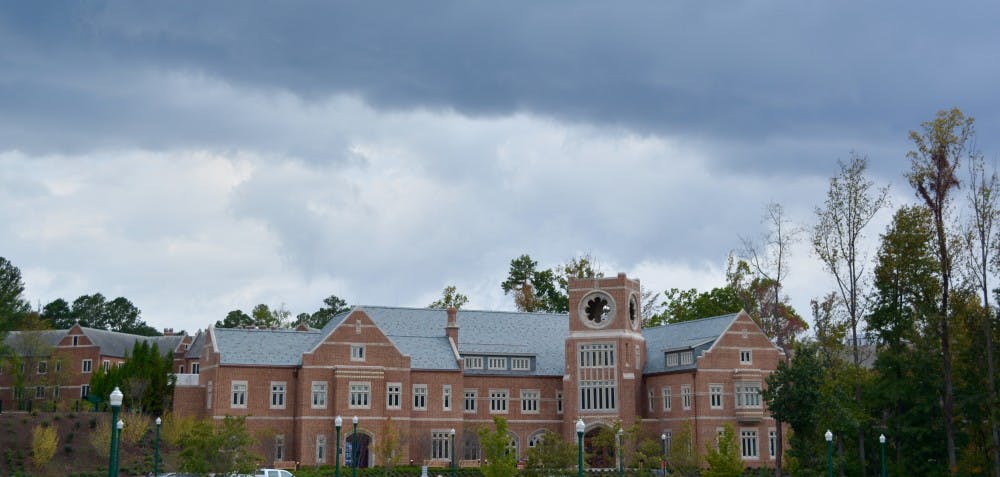On Nov. 2, the House Republicans unveiled their tax plan.
The bill, which includes a tax cut for corporations and new standard deductions of up to $24,000, also had a special provision. This provision would allow the federal government to tax the endowments of private universities that meet certain criteria by 1.4 percent.
The New York Times reported that the universities affected by the tax would be the ones that have “at least 500 students and assets of $100,000 or more per full-time student."
The University of Richmond would fall under this category.
Currently, private, non-profit universities such as the University of Richmond do not have to pay income taxes or taxes on their endowments.
David B. Hale, chief operating officer at UR, estimated that the proposed tax would cost the university approximately $3 million to $4 million a year.
The proposed change is nothing new to higher education, as there has been talk of taxing endowments for years, Daniel Palazzolo, department of political science chair, said. However, the timing is no coincidence, Palazzolo said.
“In a policy sense, you’re engaged in this process of trying to lower corporate rates and lower individual rates,” Palazzolo said. “That costs money. They’re trying to find some revenue to offset the tax cuts.”
Palazzolo also explained that the tax went against the traditional ideology of the House Republicans who had written the plan.
“Conservatives believe that the government should enhance non-public forms of civil society,” Palazzolo said. “It seems, to me, as conservatives they would want to encourage types of activity that involves, human, social and community development that’s outside government control. That’s what foundations to universities do. I don’t see a tax on that as a very conservative thing to do.”
However, Palazzolo said that while the tax went against traditional conservative ideas, it had not been quite as counterintuitive to the current populist conservative movement.
“Taxing wealthy endowments is probably more consistent with the populist strain in the party,” he said. “Wealthy universities are easy to pick on. This is a pot of money and there’s a group of elite people that are benefitting from it and the populists aren’t. It’s an anti-elitist provision.”
Enjoy what you're reading?
Signup for our newsletter
Economics professor Robert Dolan had a similar opinion on why Republicans are going after private-university endowments now.
“Republicans are questioning if the money from wealthy endowments are going to their full benefit,” Dolan said. “Private universities are raising tuitions in excess of inflation. The tension is between rich schools and where their money goes.”
Dolan also pointed out the unique status private universities had in comparison to other types of nonprofits.
“Other types of nonprofits pay a tax because there is federal monitoring,” he said. “For private universities, there is no monitoring.”
Both professors also pointed out that higher education was no friend of the GOP. Especially with the recent populist movement, higher education had been a much larger target.
But, both professors had different opinions on what the effect of the tax would be on UR.
Palazzolo predicted that effects would be seen in raised tuition rates and decreased donations to the university, since the new individual deduction standards would change in a way that would decentivize donating.
Dolan, on the other hand, predicted that the university is wealthy enough to be able to handle such a tax relatively easily.
“There’s nothing really new here,” Dolan said. “Higher education has seen this tax coming for years now. This tax will be a drop in the bucket to them.”
The current endowment was valued at $2.2 billion in 2016, as reported by the university’s website.
The university also gave an official statement on the proposed tax.
“A tax on our endowment could have serious negative consequences for us,” the emailed statement read. “Richmond’s endowment ensures that those undergraduate students who are admitted are able to attend the university by supporting a financial aid program that meets 100% of demonstrated financial need. A percentage of our endowment also is restricted to supporting professorships, which ensures that we can recruit and retain talented faculty. The endowment also annually provides a significant percentage of our operating budget.”
The bill will be voted on in the House Thursday afternoon, where it is expected to pass. But, GOP Senator Johnson of Wisconsin was the first to break away from the party to oppose the bill, a possible sign that it might not be able to make it through the Senate.
Contact news writer Julia Raimondi at julia.raimondi@richmond.edu.
Support independent student media
You can make a tax-deductible donation by clicking the button below, which takes you to our secure PayPal account. The page is set up to receive contributions in whatever amount you designate. We look forward to using the money we raise to further our mission of providing honest and accurate information to students, faculty, staff, alumni and others in the general public.
Donate Now



